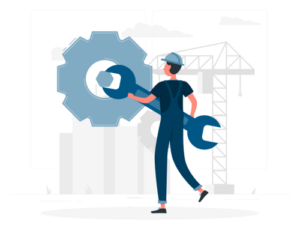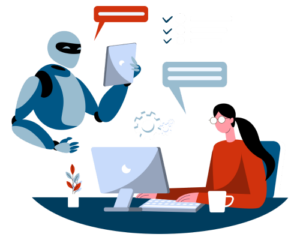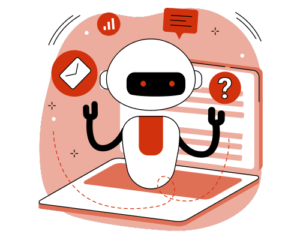Robotic Process Automation (RPA) has revolutionized the way businesses operate by automating repetitive tasks such as data entry and invoice processing. By streamlining workflows, RPA reduces the need for manual intervention, freeing up human talent to focus on more complex aspects of their work. RPA enables businesses to achieve significant gains in efficiency and productivity while also being easily integrated into existing systems.
The following article delves into the various job roles that are highly in demand in the constantly evolving field of Robotic Process Automation (RPA). The article provides an in-depth analysis of the key responsibilities and requirements for each job position, as well as the skills and qualifications needed to excel in these roles. By the end of this article, you will have a better understanding of the career opportunities available in the RPA landscape.
RPA Developer
Let’s start our exploration of RPA job roles with the RPA Developer. These individuals are like the architects of the digital world, creating software robots to automate tasks. For instance, imagine a financial institution wants to automate the process of extracting data from multiple forms and putting it into their database. That’s when an RPA Developer comes in.
Roles and Responsibilities
The job of an RPA Developer includes designing, building, and maintaining automation solutions using RPA technologies. They use platforms such as UiPath, Automation Anywhere, or Blue Prism to create robots that imitate human actions. These robots can perform various tasks, ranging from data entry and extraction to rule-based decision-making.
As RPA technologies continue to advance, RPA Developers are in high demand. The job market is competitive, and organizations are willing to pay top dollar for skilled developers who can streamline their processes.
RPA Business Analyst
The RPA Business Analyst plays a crucial role in linking the technical and business aspects of RPA technologies. They act as translators to ensure that the automation solutions align with the business objectives. Essentially, they are responsible for making sure that RPA makes strategic sense.
Roles and Responsibilities
The responsibilities of an RPA Business Analyst include understanding and documenting business processes, identifying opportunities for automation, and defining the requirements for RPA solutions. They bridge the communication gap between technical teams and business stakeholders, ensuring that the automation aligns with the organization’s goals.
With the growth of RPA, the role of RPA Business Analysts is gaining prominence. They are instrumental in ensuring that RPA projects deliver tangible business benefits.
RPA Solution Architect
The RPA Solution Architect plays an essential role in the success of the RPA project. They are responsible for designing the blueprint of automation solutions, taking into consideration scalability, security, and overall architecture. This role demands a combination of technical expertise and strategic vision.
Roles and Responsibilities
The RPA Solution Architect is responsible for understanding the big picture of the project. They design the architecture of the RPA system, select the appropriate tools and technologies, and plan how the different components will work together. Ensuring that the RPA solution can adapt to the organization’s changing needs is also a critical aspect of their responsibilities.
As organizations look to implement RPA technologies at scale, RPA Solution Architects are becoming increasingly important. Their role in designing robust, scalable, and future-proof solutions is pivotal.
RPA Quality Assurance (QA) Engineer
Quality assurance plays a crucial role in RPA implementation projects, just like in any other software development project. The RPA QA Engineers are responsible for ensuring that the robots function as expected and do not introduce any errors into the process.
Roles and Responsibilities
The RPA QA Engineers’ key responsibilities include developing test strategies and test cases for RPA solutions, performing end-to-end testing to validate the robots’ functionality, and ensuring that they adhere to the defined criteria. Their testing activities encompass accuracy, reliability, and security.
The demand for RPA QA Engineers is on the rise as organizations recognize the importance of quality assurance in RPA projects. Ensuring the accuracy and reliability of automated processes is a priority.
Conclusion
The world of RPA technologies is a dynamic and exciting field with a multitude of job roles to explore. There are RPA Developers who bring automation to life, RPA Business Analysts who bridge the gap between technology and business, RPA Solution Architects who design scalable solutions, and RPA QA Engineers who ensure quality. With a role for every skill set and interest, it is an industry worth exploring.
As you embark on your journey in the RPA industry, keep in mind that staying updated with the latest trends and technologies is crucial. The landscape is ever-evolving, and being adaptable is key to success. If you have any questions or would like to share your thoughts on the top job roles in RPA technologies, please leave a comment below. We would love to hear from you and continue the conversation.
How RPATech Can Help?
We’re a company specializing in Intelligent Automation, utilizing AI to improve your business operations. See our Services & Solutions section for our full range of offerings.
Alternatively, you can book a consultation with our experts who will assist in identifying the best solutions for your business challenges.
We also offer a half-day discovery workshop. Here, we identify ideal processes for automation within your business, assess the feasibility and complexity of automation, and guide you on starting your automation journey.




